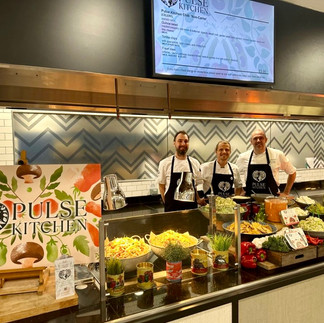

Why the U.S. Is Backing Meat & Dairy and Side-Lining Plant-Based Proteins?
The new U.S. Dietary Guidelines just out have done something almost unthinkable in the post-2019 food wars as they’ve re-centred red meat, dairy, eggs, poultry and seafood as primary protein sources, while quietly sliding plant-based proteins further down the nutritional hierarchy. Not banned. Not dismissed. But no longer treated as nutritionally equivalent. That alone tells you something fundamental has shifted.
16 hours ago1 min read


Why Believer Meats, Meatable (and Meati) Closed - While Redefine Meat Keeps Selling
Fresh news shows US based, mycelium-based maker Meati Foods has had its property seized for nearly $7 million in unpaid taxes, illustrating just how severe the downturn has become in the proteins world.
This follows the earlier winding down of Believer Meats and Meatable, both of which shuttered operations despite raising multi-millions because they couldn’t simultaneously crack cost, scale, and market adoption. In each case, promising technology met the harsh economics of f
3 days ago1 min read


The Meat-Plus Era Has Begun as Kiwi Hybrid Protein Evolves
Meat isn’t being replaced, it’s being re-engineered, and New Zealand is now part of that shift. Across food science, a new logic is taking hold, the future of protein isn’t “meat versus alternatives,” it’s meat plus. Hybrid protein , a blending of animal protein with algae, yeast, plants, or fermentation-derived biomass, is emerging as the most commercially realistic path to better nutrition, lower environmental load, and preserved taste. This isn’t a food trend. It’s a re
3 days ago1 min read


Can New Zealand Become a Serious Player in the Global Truffle Game?
Since the first Gisborne truffière produced in 1993, more than 40,000 inoculated trees across 100+ sites have been planted from the Bay of Plenty to Canterbury. Yields of well over 100kg per hectare have already been achieved, reputedly among the highest in the world for cultivated truffles. Agronomically, New Zealand isn’t the problem but whether the country can become a serious player in the global truffle game.
4 days ago1 min read


The Tiny People Mushroom Mystery
According to researchers at the University of Utah, this species triggers Lilliputian (tiny people) hallucinations, in other words vivid visions of tiny human-like figures dancing, marching, and interacting with the environment. But what’s interesting is 96% of documented cases report identical imagery. No psilocybin. No ketamine-like dissociation. Just tiny people. Everywhere.
5 days ago1 min read


Juicy Marbles Moves Beyond the Fillet and Into the Fridge Staple Zone
Juicy Marbles built its reputation on theatrical, whole-cut plant-based steaks, the kind designed to be carved, shared, and Instagrammed. Now the company is deliberately stepping down from the dinner-party pedestal and into everyday eating, launching its new Umami Burger across 225 UK Tesco stores.
Dec 31, 20251 min read


Top 10 FoodTech Companies to Watch in 2026
FoodTech in 2026 isn’t about who has the wildest idea, it’s about who actually shows up in food people eat. After years of hype, pullbacks and painful reality checks, a new class of companies is quietly moving ahead by doing something radical - making workable ingredients, scale, and slot into everyday products without asking consumers to change their habits.
Dec 31, 20251 min read


Kimchi Moves From Cultural Wisdom to Precision Immune Food
Kimchi has always been more than a side dish. For centuries it’s sat at the heart of Korean food culture, not as a “superfood”, not as wellness theatre, but as a daily, living eco-system of nourishment. Now, science has finally caught up. A new clinical study from South Korea’s World Institute of Kimchi reveals kimchi doesn’t just “boost” immunity, it fine-tunes it.
Dec 30, 20251 min read



























Comments